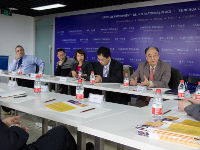Registration
You will receive an email confirming your registration.
IMGXYZ3508IMGZYXIn the past few years, the Nuclear Suppliers Group (NSG) has confronted two cases of nuclear commerce not compliant with its criteria. The first came in 2008, when the United States sought a waiver to allow civil nuclear cooperation with India, and the second in 2010, with China’s announcement of intent to supply of two nuclear reactors to Pakistan. At the eleventh China-South Asia Dialogues seminar series and fifth Arms Control Seminar Series, Toby Dalton, Carnegie’s Deputy Director of the Nuclear Policy Program, met with a panel of Chinese experts to explore these two divergent cases and to suggest common NSG criteria. Carnegie’s Lora Saalman moderated.
Suboptimal Arrangement
Dalton explained that while he had no intention of criticizing China for supplying nuclear reactors to Pakistan, the current arrangement is suboptimal for several reasons:
- China: Dalton argued that the chance of earthquakes, floods, or terrorism at Pakistan’s nuclear facilities remains high. Given China’s role as a nuclear supplier, he noted that such an incident could adversely impact China’s domestic and international nuclear market. One Chinese expert argued that the likelihood of this occurring is low since China has a perfect nuclear safety record. Dalton responded that though China and Pakistan both have good nuclear safety records, Pakistan is not currently a safe environment in which to operate nuclear plants.
- Pakistan: The nuclear reactors Pakistan has and will receive from China have not and are unlikely to resolve its energy problems, which stem from decaying infrastructure and pool policy, Dalton added. The two Chinese reactors in current operation cover less than 20 percent of Pakistan’s existing electricity supply deficit.
- NSG: Bypassing the NSG for approval in future nuclear-related transfers to Pakistan would undermine the NSG and also the nonproliferation regime, Dalton contended. Some see such actions as violating China’s NSG commitments, in contrast with U.S.-India efforts to seek NSG approval, he noted. One Chinese expert suggested that the United States should lead by example, building criteria in layers to facilitate compliance.
Criteria-Based Approach
Saalman argued that within China, there is a great deal of criticism for the exceptionalism of the U.S.-India nuclear cooperation agreement. Dalton responded that the Nuclear Suppliers Group could be strengthened by a generic, criteria-based approach to nuclear trade with states not implementing full-scope safeguards. Such an approach would improve nuclear safety and security, export controls, and strategic restraints. Dalton emphasized that the criteria for such an approach should include:
- Nuclear Guidelines: Dalton argued that Pakistan could serve as the litmus test for a criteria-based approach, providing it with a clear path to gain the international legitimacy it seeks. This would also place Sino-Pakistan nuclear cooperation in better standing in the eyes of the NSG, protecting China’s long-term interest in expanding nuclear exports. As such, Pakistan should be required to follow the same guidelines as India, including: declaring its nuclear facilities to the International Atomic Energy Agency (IAEA); signing and implementing the Additional Protocol; maintaining a nuclear test moratorium; refraining from enrichment and reprocessing technology transfer; ensuring high standards for export controls and updating of control lists
- Nuclear Security: Pakistan should sign and ratify the International Convention for the Suppression of Acts of Nuclear Terrorism, Dalton added. It should also implement IAEA recommendations for the physical protection of nuclear materials, he said.
- Nuclear Safety: Pakistan should sign and ratify the Convention on Nuclear Safety, allowing peer reviews of its nuclear facilities, argued Dalton. Pakistan continues to lack an independent nuclear regulatory body to manage its nuclear facilities, he said.
- Fissile Material Cut-off Treaty: Dalton noted that it would be difficult for Pakistan to adhere to an FMCT, suggested by its expanding plutonium production. For a country to be eligible for nuclear trade, Dalton argued, it must demonstrate nuclear restraint.
- Terrorism: Citing frequent reports that Pakistan supports groups engaging in terrorist activities outside of its borders, Dalton also drew a contrast with India, which as part of its strategic partnerships with the United States agreed to counter terrorism. He argued that Pakistan must be more diligent in this area to qualify for NSG approval.
Difficulties for India
Saalman noted that U.S. President Barack Obama has voiced U.S. support for India’s NSG membership and asked how these criteria might impact India’s own nuclear trade and potential integration. Dalton responded that leveling the playing field is one desired outcome. Since the NSG works by consensus, India and Pakistan must have the same criteria, pathway, and timing when and if entering the group, he added.
Incentives for China
Dalton stressed that when it comes to Pakistan, China has greater influence than the United States. He argued that the long-term economic potential of China pursuing a criteria-based approach at the NSG would far exceed revenue from its proposed sale to Pakistan. China would also be eligible for concessionary loan terms, once Pakistan garners NSG approval. Dalton stressed the importance of China suspending reactor construction in Pakistan until more safety and security measures are in place, arguing that if the Fukushima incident in Japan had forced China to temporarily halt its own nuclear-related construction, then this should also be the case for its cooperation with Pakistan.
Discussants: Cheng Ruisheng, Zhai Dequan, Ma Jiali, Han Hua, Ren Jingjing, Liu Chong, Mao Jikang, Song Haixiao, Zhou Shuai, Lin Yunzhi, Ariel Levite
